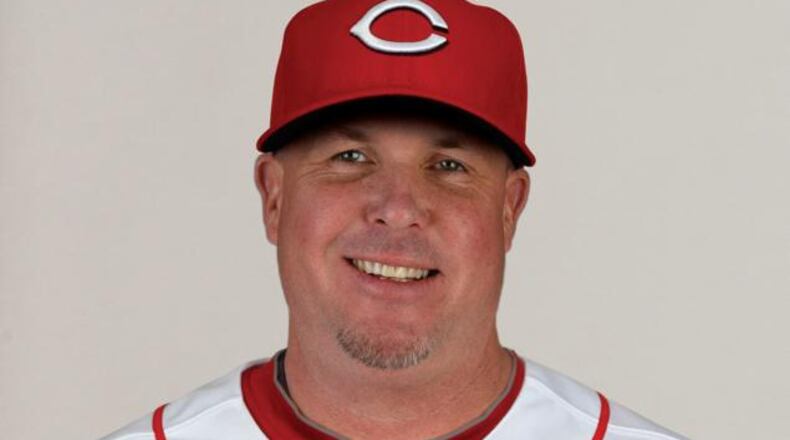The former Vanderbilt University coach who had 13 pitchers drafted by major league teams during his decade with the Commodores, said he sees talent in the thus far underachieving young pitchers on the Reds' staff.
He emphasized that his plan is to emphasize the positives he sees in them and to de-emphasize the negatives, concentrate on their strengths and pay less attention to any weaknesses.
»RELATED: Two Reds finalists for Gold Glove
While sitting in the Brewers dugout the last three seasons, Johnson saw what everybody saw, a strong offensive team with pitching deficiencies.
"I've said this numerous times," said Johnson. "I see a collection of some really good arms, some arms that can make a jump and will make a jump.
“I felt the Reds were a sleeping giant from the standpoint of the Reds being well-known for offense,” he added. “They are a very, very good offensive club. I can tell you that for the last three years I tried to figure how to get them out and didn’t always do a great job. Offensively, I always felt they were where they needed to be.”
How about that pitching, Derek?
"Well, I looked over and saw guys who I thought had some really good arms who are about ready to make a jump," he said. "From my perspective, the sky is the limit. There is a good collection of pitchers who can make some improvements.
"From my end, it is starting with a basic philosophy of the direction we want to go, who we are and what are we going to try to do. That's the first steps you'll see in spring training."
Credit: DaytonDailyNews
Who the Reds are right now is a team that has finished last four years in a row with a strong offense and dismal starting pitching. How does that get fixed quickly? And what will that philosophy be?
“The one stand-out thing and the thing (new manager) David Bell and I have talked about a lot is to try to zip up weaknesses.
"And while we do have to worry about weaknesses and try to develop weaknesses into strengths, the big part of my time is going to be in developing the strengths. When I saw that, I have this saying: 'Be great at what you are good at.'
"The gist is that each one of these pitchers come to us with strengths and that's why they are in the major leagues, why they are a major league pitcher or close to being one. In my mind, we spend way too much time trying to develop what they are not and the things they don't have and opposed to trying to develop things they already are good at.
"To me, that''s a separator," he added. "When you look at it that way, a couple of things happen. Number one, the player never gets too uncomfortable because he is already good at this, what got him here in the first place. You are not trying to change everything about him.
"That's really important because there is a psychological benefit to this," said Johnson. "The physical side of it is that you can do more with the strength than you can with the weakness or the lack of a certain attribute the pitcher doesn't have. If we exploit that first, get after it first, then a lot of things take care of themselves. That will be my primarey focus."
So the big questions is why would a successful pitching coach, working for an organization that won the division and is still on the rise, leave to join a team struggling for success and identity.
The quick answer, of course, is money and the Reds reportedly outbid the Brewers, who wanted Johnson to stick around.
Asked about that, Johnson laughed and said, “I guess that’s a great question. It was a window of opportunity for me to find out what was out there. The three years I was with the Brewers was a wonderful experience. I can’t tell you how much I’m going to miss that place. I loved (manager) Craig Counsell, I loved the people there. But it was a chance to better my situation.
“Cincinnati is closer to home and there were a lot of factors,” he added. “Coaches don’t get these opportunities often, we’re kind of stuck. From the beginning of it, and it didn’t take very long, the Reds were very persistent and me extremely comfortable and extremely wanted.”
About the Author
